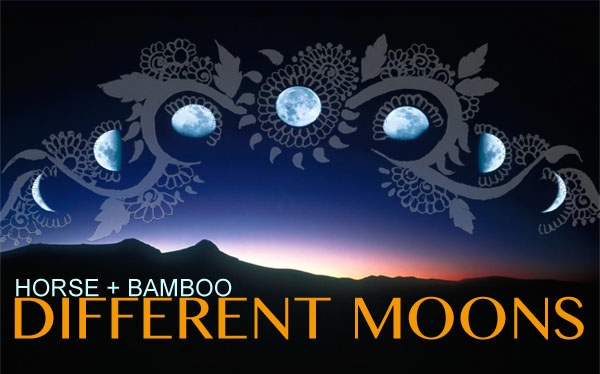1. Mazhar Hussain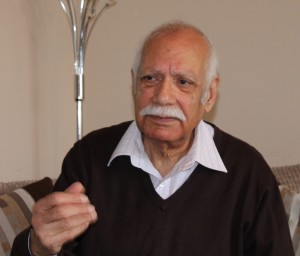
Mr Mazhar Hussain was born in Kapurthala (India), at the time of partition his family had to move to Pakistan. His grandfather had been a tutor to the prince of Kapurthala and the young Mr hussain was also encouraged to study. After graduation (Islamic College, Lahore) and three years’ textile work experience, he left Pakistan to further his education. In 1956, aged twenty five, he came to England to study Textiles at Burnley College. Mr Hussain describes the three week journey he took by ship. An animation of this journey has been created by Habiba Shenza. Mr Hussain later worked in textile technology and was involved in local politics. He settled into life in Haslingden determined to make a difference. He was responsible for introducing the first Asian language books into Haslingden Library and being instrumental in setting up the first mosque on Blackburn Road. Mr Hussain and his wife Samina Hussain now live in Accrington. Mr Hussain related a story that his daadi (paternal grandmother) used to tell him about a djinn. This is the second of the animations inspired by Mr Hussain’s interview. These animations and Mr Hussain’s life were used as inspiration for the Different Moons children’s workshops.
Click on the following links to read extracts of Mazhar Hussain’s interview on his:
First Impressions; Contributions and Achievements;
Creative Heritage; The Future; Sayings
Click here to listen to audio clips of Mr Hussain.
2. Said Rahman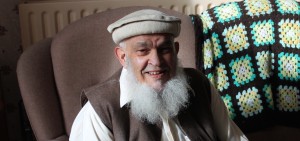
Mr Said Rahman was born in Pakistan in 1934. He joined the Merchant Navy, doing two years with them before leaving when the ship docked in Hull (Humberside). After a stop of a few days in Bradford he arrived in Haslingden where he and his family have settled. He describes how in the early days it was very hard to get accommodation and working men would share beds on a shift basis. Mr Rahman worked at Whitehead textile mill for fourteen years and also worked as a stripper and grinder in local factories. He returned to Pakistan to get married and his wife Zamro Rahman came to join him in 1964. Mr Rahman helped to set up one of the first mosques on Station Road in the ‘80’s.
Click on the following links to read extracts of Said Rahman’s
interview on his:
First Impressions; Contributions and Achievements;
Creative Heritage; The Future; Sayings
Click here to listen to audio clips of Mr Rahman.
3. Zamro Rahman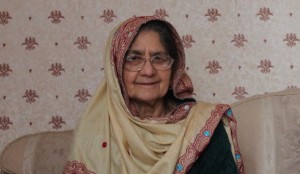
Mrs Zamro Rahman as born in Pakistan, she came to join her husband in England in 1964. She came alone, arriving at Manchester airport where her husband Said Rahman came to meet her. When she first came to Haslingden she says there were very few Asian people, but they used to call in at each others’ homes and everyone was much friendlier. Mrs Rahman later had children and she describes how her husband helped with the two home births. Mrs Rahman worked in the home raising her children and making moccasin slippers. Mr and Mrs Rahman have grandchildren including Habiba Shenza (Rahman) who conducted the interviews with both her grandparents. Extracts from Mrs Rahman’s interview were used to inspire the Different Moons girls’ groups to write about what they would like to ask their grandmothers about their lives.
Click on the following links to read extracts of Zamro Rahman’s
interview on her:
First Impressions; Contributions and Achievements;
Creative Heritage; The Future; Sayings
Click here to listen to audio clips of Mrs Rahman.
4. Aslom Miah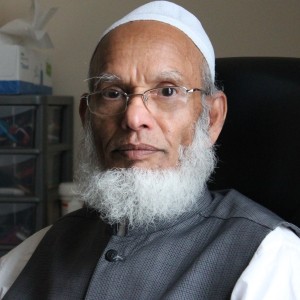
Mr Aslom Miah was born in in 1937 in a village called Moishashee, in the Sylhet region of Bangladesh. He describes the wonderful life he had in Bangladesh, swimming in rivers, going to school and being with family. He came to England in response to an advert calling for workers from the Commonwealth. He tells of how he begged his mother to allow him to come “you allow me and I’ll come back within two years” he promised. In 1963 he left Bangladesh (before independence, 1972) aged around twenty five years and, like many others who came at that time, he eventually settled here. Throughout his life Mr Miah has missed his family very much, in particular his mother to whom he dedicated his book. The story of his early life and devotion and love for his mother are captured in a series of three animations created by Kain Leo as part of the project. His descriptions of the hardship of living conditions and in particular the challenges of outside toilets inspired an animation by Rehmat Gangreker (Mr Miah describes the support he got from local people; learning English and finding out about local services. Over the years he had many jobs, working in mills, setting up a business, acting as an interpreter and working as a bus conducter. Mr Miah became to be a well recognized and valued member of the Haslingden community. His advice for future generations is that “the future of children is education”.
Click on the following links to read extracts of Aslom Miah’s
interview on his:
First Impressions; Contributions and Achievements;
Creative Heritage; The Future; Sayings
Click here to listen to audio clips of Mr Miah.
5. Samina Hussain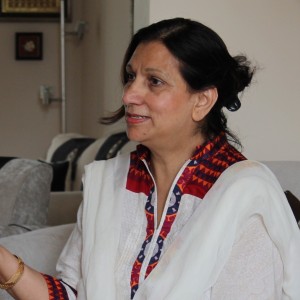
Mrs Samina Hussain was born in Karachi, Pakistan. She studied Child Psychology and Islamic Studies. She describes how at age twenty one she began work as an air hostess. A few years later her marriage to Mr Mazhar Hussain was arranged and she came to join him in England in around 1981, aged twenty four. Mrs Hussain describes how she was surprised by how conservative the South Asian communities in Haslingden were. An animation of how she set up a women’s forum illustrates the success and positive input she had on developing opportunities for local women. Mrs Hussain has worked as a nursery nurse, a magistrate, helped organise mushairas (poetry gatherings) and delivered children’s Saturday classes. She worked at Accrington and Rossendale College in Marketing and Community Development, and currently works for a local radio station and for an organisation that supports English citizenship courses. Like her grandfather Munshee Ali Bakhsh, (a contemporary of Allama Iqbal) Samina Raffat Hussain (Pen Name) is also a poet. Her poems were used for the Different Moons women’s workshops and were part of the paper-cut artwork created by Maryam Golubeva as featured in the Different Moons Exhibition and Book. The story that her father used to tell her about a bird and a poor family was used as the inspiration for an animation and for writing workshops with children; their poems and stories appear in the Different Moons Book.
Click on the following links to read extracts of Samina Hussain’s
interview on her:
First Impressions; Contributions and Achievements;
Creative Heritage; The Future; Sayings
Click here to listen to audio clips of Mrs Hussain.
6. Farida Munir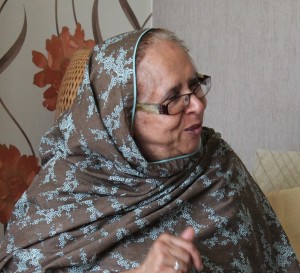
Farida Munir as born in Lahore, Pakistan. She had a happy childhood; she tells of the gullie danda (ball and stick) games she played, how she loved to climb fruits trees and enjoyed studying. She studied to GCSE level (Metric) in Pakistan and later in her life she continued her studies in England as her father had promised her. Extracts from her interview were used to inspire the Different Moons women’s group to write about their fathers and education. Farida describes how her marriage was arranged over the phone and tells of her journey coming alone to England in 1967 to join her husband at the tender age of sixteen. She describes the smoke and poor toilet facilities and how “the atmosphere wasn’t very appealing”. She missed her family and young siblings, but once she had her own children she became determined to enable them to have a good education, and the family decided to settle in Haslingden. As well as raising her children, Mrs Munir had a number of jobs, sewing for Karrimor and as a Youth and Community Worker, she was one of the first South Asian women to set up a girls’ youth group in Haslingden. She like others we interviewed felt Asian languages were in danger of being lost to second and future generations. She recited an Urdu nursery rhyme used for a Mother and Babies workshop. The story of her early life was performed as a puppet show by Elisa Sarchi and later made into an animation by Bob Frith.
Click on the following links to read extracts of Farida Munir’s
interview on her:
First Impressions; Contributions and Achievements;
Creative Heritage; The Future; Sayings
Click here to listen to audio clips of Mrs Munir.
7. Luai Ullah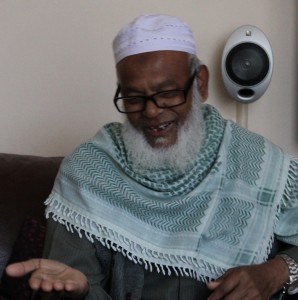
Mr Luai Ullah was born in East Pakistan (later Bangladesh), he came to England in 1963 aged twenty six. He describes playing games including kabaddi (a team game involving grabbing hold of opponents), going to school and late night story telling. As a young boy, he also helped out with household chores, with the cows and in the paddy fields. Mr Ullah’s mother died when he was just eleven years old and he continues to miss her dearly. Mr Ullah’s father worked on the ships and in 1954 he jumped ship at Liverpool to avoid the terrible working conditions. He travelled to Rawtenstall and began work in the cotton and wool industry at a firm called David Whiteheads. There was a demand for workers in the industry and he was able to invite his son, the young Mr Luai Ullah to join him. Mr Ullah describes his surprise at seeing deep snow, tall white people and at the lack of bathroom facilities. He is enthusiastic about all the support he got from local people in particular an Italian woman Mary who delivered halal meat and other provisions to people’s homes. Mr Ullah later worked at Smith and Nephews becoming experienced in cotton and wool spinning and manufacture. He worked hard; following his father’s advice to stay focused, and is happy to have been able to send money to help support family back in Bangladesh. His interview was conducted mainly in Bengali.
Click on the following links to read extracts of Luai Ullah’s
interview on his:
First Impressions; Contributions and Achievements;
Creative Heritage; The Future; Sayings
Click here to listen to audio clips of Mr Ullah.
8. Mohammed Ishaque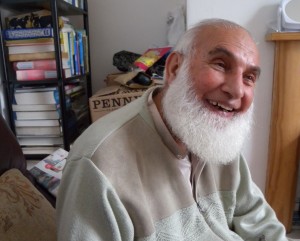
Mr Mohammed Ishaque was born in the Attock region of Pakistan. He describes winter life living in a rural area hunting fox and jackals. How people would gather around a fire at night after and tell stories. Although his family were not able to afford post graduate education for him, he was lucky to graduate in Physics and Chemistry and came to England in 1960 aged twenty one. He arrived in Bradford and came to Haslingden to find work. He was surprised by the lack of amenities; there were no flushing toilets (Tippler toilets) and not every home had a bath. Mr Ishaque says how friendly people were when he first came, and the support local people gave during periods when there were challenges to the growing Asian presence. He also used his skills to help support local new arrivals with form filling and paperwork. Mr Ishaque worked in a number of factories and was successful in getting a job at Paragon Works, a job which reflected his training. His Chemistry research into polyurethanes resulted in him pioneering the formula for a specialist none burning foam which was patented under his name. He has travelled widely to Europe and Africa and goes to Pakistan regularly, but he appreciates the tolerance and values of Britain saying: “that this county is the best country. The best.”
Click on the following links to read extracts of Mohanned Ishaque’s
interview on his:
First Impressions; Contributions and Achievements;
Creative Heritage; The Future; Sayings
Click here to listen to audio clips of Mr Ishaque.
9. Sufia Choudhury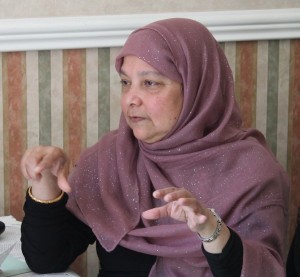
Sufia Choudhury was born in the Sylhet region of Bangladesh in 1954. She describes her childhood playing marbles and hopscotch. She had a happy early life with her family and at school and college. She studied English, Mathematics, Sociology and Islamic Studies to “A” Level (Intermediate). She married in 1973 aged eighteen and a half. In 1979 when her eldest son was five years old she came to England with her children to join her husband. She was excited about coming to England and describes her high expectations but was shocked by the harsh conditions and poor living standards. She missed her family and many things about Bangladesh including the food. She describes how much has changed from when she first came; telephones, central heating and the Asian community itself. She went to college to learn English and later worked for twenty five years as a school play worker and for eighteen years as a youth worker. She is most proud of having raised her children, all of whom went to grammar schools and her daughter who studied at Cambridge University. She like others felt that mother tongue was one of the aspects of Asian culture that is most in danger of being lost. She encourages the next generation to also take benefit of the British education system. Mrs Sufia Choudhury took part in the women’s workshops and some lines from her poems feature in the Different Moons Book.
Click on the following links to read extracts of Sufia Choudhury’s
interview on her:
First Impressions; Contributions and Achievements;
Creative Heritage; The Future; Sayings
Click here to listen to audio clips of Mrs Choudhury.
10. Waseema Azfar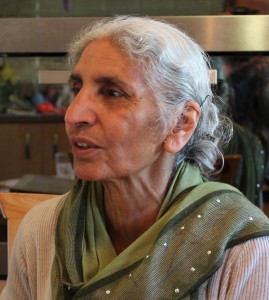
Waseema Azfar was born in Pakistan in 1939. She lived in a big extended family, which she missed very much when she came to England. She went to Lahore College and trained to be a teacher, teaching eleven plus age groups in mathematics, English and Islamic Studies. Whilst still a young woman she was sent a letter of proposal of marriage from a distant cousin on her father’s side. Her marriage was arranged and she came to England to be married in 1962, not having yet met her husband to be. She laughs that her first impressions of England were that it was “damp, cold! Horrible. I did not like a bit!” They first lived in Manchester (Harpurhey), but later moved to Rossendale. Her husband was a draughtsman by trade, drawing for the ginning machinery for cotton, but he wanted to have a farm life. Mrs Azfar and her husband moved to Weir having bought a farm house with large plot of land. They renovated the house and farmed until the 1970’s, keeping mostly cows early on, then lamb, sheep and chicken. For some ten years Mrs Azfar ran a petrol station that they had built on part of their land and also had a sewing job for a while. Despite all the enterprising things she has done she is most proud of her children “…they are my world, put it that way… and my grandchildren of course”. She and her remaining family have lived in their current home for fifty years. Mrs Azfar says that the aspect of South Asian culture that is most in danger of being lost is honesty. She feels the people who are fighting in the name of religion are going against the intention of Islam.
Click on the following links to read extracts of Waseema Azfar’s
interview on her:
First Impressions; Contributions and Achievements;
Creative Heritage; The Future; Sayings
Click here to listen to audio clips of Mrs Azfar.
